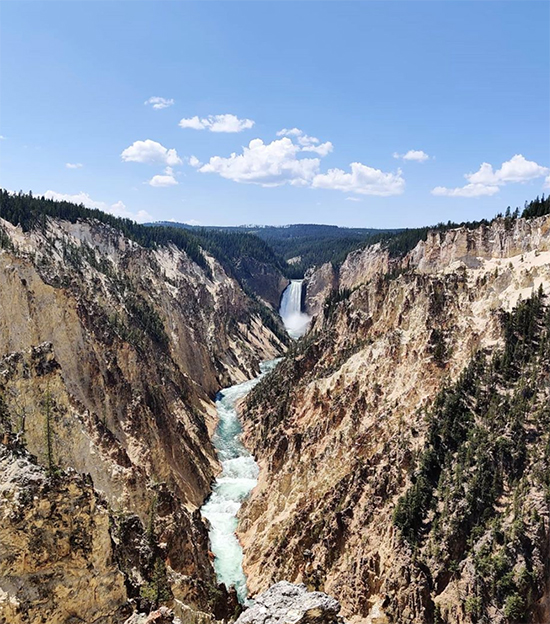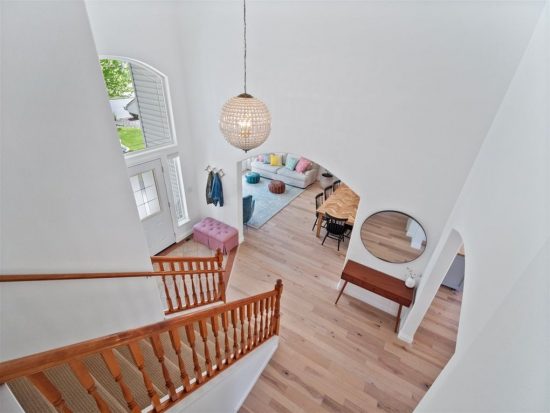23
This is a collaborative post. All opinions are my own.
Well, 2020 has been quite the rough year. Thankfully, none of my family has gotten sick from the coronavirus pandemic. And I am SOOO relieved that none of my kids are in school yet (figuring out online school sounds...not fun). But still, this year has been hard. Like everyone else, we've been confined to our home, going a little stir-crazy and feeling sad about our vacation plans getting blown out of the water. We had originally planned to travel to Scandinavia or Croatia this year...then we talked about going to Iceland and exploring the West Fjords...then we talked about a few weeks in Maui...but with all those destinations being in various stages of lockdown, we've had to rethink our plans. Of course, I totally understand why travel has been limited, but man, am I ever ready for a vacation. So with all of us feeling healthy, we decided that we should still do a 2020 trip! Since flying internationally isn't really an option right now, and since we'd prefer to be outdoors, we decided on (dun dun dun)...a National Park road trip!!! At first, I was disappointed that we wouldn't be able to go somewhere more "epic" and far away (we have a ton of credit cards points that we had intended to use for flights)...but as I've been planning our itinerary, I've gotten more and more excited for the new plan. The United States is gorgeous, we love road trips, and fall is our favorite time to travel. It's going to be amazing! But traveling in the time of Corona means there are extra things to think about. If you're still hoping to plan a getaway in 2020, here are some things to consider.
We were partially inspired by my brother and his wife. They road tripped to Spokane for my sister's wedding earlier this month, traveling through many of the same national parks that we put on our itinerary. They said they felt safe and were able to stay distanced, and their pictures looked amazing! This is their photo of the Grand Canyon of Yellowstone.
Think Local
You don’t have to go overseas for a good time. Right now, it's probably much safer to stay closer to home, so why not consider a staycation in your region and home country? Think about what destinations are within driving distance from you. Are there beaches? National parks? Friends or family you can safely visit?
Consider Outdoor Destinations
With restaurants and indoor entertainment being restricted, this is not the year to visit big cities. Instead, think of outdoor destinations where you can stay safe and see some beautiful sights. If you live in the U.S., we are spoiled for choice. There is so much natural beauty in our country, and lots of variation too. No matter where you live, you can find a place that feels like a totally different landscape from your home. When we went to Bryce Canyon and Arches in 2016, I remember the red rocks being so impressive and entirely different from Washington state.
Arrange Your Beauty Treatments
Many of us have been forgoing beauty and hair treatments, both because salons were closed for awhile, and because we have been staying home so much! But with beauty businesses opening back up, a vacation is a good excuse to treat yourself and schedule whatever it is that you've been missing. Before you leave for your trip, arrange to get a treatment that helps you be summer ready and feel like the best version of yourself. This could be a wax, a haircut, getting your nails done, a pedicure, eyebrow shaping or anything else!
Research and Book in Advance
Right now, with distancing guidelines and reduced capacity, you may need to make advance bookings for services you’d usually walk into. This could range from restaurants to public attractions and sights. Some highly rated places may not be open at all, so as you're researching the top things to do, make sure to double check if there are any Covid closures. For example, in Glacier, the east side of the park is closed--including Many Glacier and some of the most stunning views. This is disappointing, but knowing it ahead of time is much better than finding out once we're already there. Right now, it's extra important to do your research, check for Covid restrictions, and book any must-see places in advance.
Ensure Bookings are Refundable
Times are unpredictable right now, and we don't know if different regions or states will re-enter lockdown mode. We also can't guarantee that none of us will get sick (although of course, we'll do everything in our power to stay healthy). So I tried to make sure that anything we booked was refundable. We don’t want to find ourselves paying for hotels or attractions that we can’t even visit. "Plan for the worst, hope for the best," right? To give yourself options, I recommend looking for places that allow cancellation up to the day before, as this will allow you to make final decisions without worrying about money.
We are super excited and READY for a getaway, while doing our best to be responsible and prepared! With some extra planning, I believe we can still have an awesome and memorable 2020 vacation.
21
This is a collaborative post. All opinions are my own.
We've all been staying at home more since the beginning of the pandemic, so it makes sense that we've been consuming more power. Indeed, according to statistical reports published by the renewable energy company Arcadia, for 1 in 3 Americans, energy costs have increased by 10% or more this summer. Whether you’ve been unemployed, on furlough, or working from home, you’ve been relying on electricity, water and gas during the daytime, at hours when you would have otherwise been elsewhere. Arcadia also points out that the increase will happen on top of the usual power peak in summer. Cities with denser populations such as New York and Philadelphia are expected to get hit hardest, with a cost increase of up to 15%. And if you've already been struggling to make ends meet since March, an extra 15% on your bill can be significant. If this applies to you, be sure to see if your power company offers an assistance program that will allow you defer bills or get a discount. But no matter what your financial situation is, it's smart to look forward to the future. As long as COVID-19 remains a threat, the home-based trend will not go away. So focus your attention on solutions to cut down your future energy bills. Here are ten common reasons for high energy bills.
1. The house is big
Homeowners love a big house. Most of us look at tall ceilings, extra square footage, and open concept layout as positive things. However, with that comes increased costs to keep the house heated or cooled down, depending on the season. One of the first things we noticed after we moved is how much we're saving on our energy bills now that we've downsized from our old house (above) with 2400 sq ft and lots of tall ceilings, to 1300 sq ft with more closed off rooms. We're saving over 25% on energy costs, simply by moving into a smaller property. And honestly, our small home is cozy and liberating (at least for now!). Besides reducing our energy costs significantly, it's also lifted the burden of how much we have to clean and maintain. If downsizing is something you've been considering, lower energy bills will be a nice side benefit. And if you're happy with your house and have no desire to move, try shutting doors and closing window treatments in unused rooms so you're not wasting energy on keeping them a comfortable temperature...when you're not even in there.
2. You don’t consume mindfully
There is no denying that staying at home increases our power needs. This pandemic situation has a foreseeable and logical consequence on our energy bills. However, that doesn’t mean that you can’t make a difference in the long term. Bad consumption habits can pile up unnecessary waste. Adapting your energy consumption mindfully can make a huge difference--as much as 15% on your energy bills. Here are common types of thoughtless consumption at home:
- You leave the water tap on when you brush your teeth
- You take a long, hot shower before bed
- You leave lights on during the day instead of utilizing natural light
- You don’t pay attention to peak energy-use times
- Your electric devices are always plugged in, even when you don't need them
- You leave the lights on when you're out of the house
And there are many other little things that can add up. See if adjusting any of those behaviors can make a difference.
3. Your provider is expensive
Not all energy providers have equal services and prices. Most compete on price per location – which means that depending nowhere you are, you may need to switch to find a better deal. Complex plans and contract terms can also influence your costs. Constellation, for instance, stands out for its competitive prices and transparent terms, making it easier for customers to know how much they’ll end up paying. On the other end, other energy providers use variable rates across multiple locations and don’t safeguard rates for customers, making bill costs high and unstable. You could be wasting a lot of money with a provider that doesn’t get you the best rate for your consumption. It’s also a good idea to look for green energy providers, as these providers may be able to keep costs to a minimum. A couple phone calls and a little comparison shopping could really pay off.
4. You haven’t jumped onto the sustainability bandwagon
Most households assume that renewable energy solutions are not suitable to support their power needs. But that may not be true! Off-the-grid accommodations can supply their energy using a generator and sources of renewable energy, reducing their energy consumption in the process. Suburban and urban homes can also benefit from professional solar panel installation. Expert Iowa Solar says that, on average, customers can save over $1,100 per year on electricity bills with a system size of 6 kilowatts. However, savings will depend on your location (a sunny town in California will have abundant solar energy compared to a cloudy town in Washington). If you live in a state that has a Solar Renewable Energy Credit program, you can earn credit for the energy your panel produces. Typically, credits have a resellable value so that you can make money too! Even if you don't install full solar panels, think about using solar exterior lights, which are a smart and easy way to take advantage of solar energy to reduce your electricity bills.
5. Your home isn’t well insulated
Insulation plays a huge role in your energy bills. Most people tend to think of insulation problems in terms of windows or under-roof insulation. However, your home loses heat in winter (or fresh air in summer) in many ways! Something as simple as a crack on your façade wall or damaged siding panels could let the air through. Another common place that most people forget about is doors. If your door is cold to the touch, chances are that the door frame lets too much air through. By tackling these issues, you'll be improving your house's energy efficiency--and improving your curb appeal while you're at it. For example, installing new siding panels could bring an additional insulation layer, and a new door can give your entrance a tighter seal (and a fresh new look).
6. You’ve got energy vampires
Energy vampires are those appliances that love to suck up all your power even when they’re not running. Typically, idle gadgets are the silent enemies that affect your energy bills. Did you know that they can waste up to $10 billion in energy every year? You need to identify those vampires and learn to manage them accordingly. In the kitchen, the microwave and the coffee makers are always hungry for energy, especially if they have a clock display. The fridge and freezer can’t be easily unplugged during the day. However, if you don’t remove build-ups inside the appliance, they use excess power to maintain their temperatures. In the living room, your TV can consume as much as $150 annually on standby. That’s even more if you’ve got a gaming console too! The key takeaway: Unplug devices that can be turned off safely and keep other appliances maintained.
7. You don’t have smart sensors
A smart sensor monitors the temperature inside your home. However, what makes it a smart device, is the fact that it can be programmed to maintain a comfortable temperature in the most cost-efficient method. An individual is more likely to turn the heater or A/C on when they notice that the interior temperature has become uncomfortable. However, by the time you notice that the house is too cold or warm, the energy expenditure to address the situation can be significant. On the other hand, a sensor can spot minor discrepancies and act rapidly before the interior ambience becomes unpleasant. Additionally, a smart sensor can also collect data throughout the day and compare to other sources of knowledge, such as the weather or appliances in use. If you spend a morning baking, the sensor can turn the heater down to save cost, for instance.
8. The house is too dark
The level of light in our home can have an impact on our perception of temperature. In the winter, your body may find it more difficult to stay warm in a dark atmosphere. In summer, too much brightness could have the reverse effect, and make you feel too hot. Adjusting your window treatments throughout the day can help bring your body’s circadian rhythm under control. In the winter, open up all your window treatments to maximize natural light. In the summer, use blinds that let the light in while keeping the heat out. This will keep your home bright without making it feel uncomfortably hot.
9. You don't have energy efficient window treatments
Speaking of window treatments, another way to significantly reduce your energy bills is to install more energy efficient window treatments. If you have thin, unlined curtains, they aren't doing much. Blinds also allow more energy transfer than shades do. For maximum energy efficiency, go for cellular shades, which use honeycomb shaped cells to trap air for insulation. Another good trick that looks beautiful is to layer thick curtains over shades with a liner. Make sure the shades are fit tight to your window, and pull the curtains closed at night.
10. The indoor air is too dry
Lastly, your indoor air quality can affect your energy consumption. Ideally, your indoor air humidity levels should be between 30% and 50%. If the humidity goes over 55%, your home could become a favorable terrain for mold growth. It also makes the rooms hard to heat in winter. When the air humidity is too low, however, the air becomes too dry. Dry air affects your perception of temperatures. It will feel colder than it is, which means that you need to heat your home more than you otherwise would.
Keeping your energy bills on a budget can be a challenge for stay-at-home families! Simple changes, such as adding a source of renewable energy and introducing more natural light to your interior can help cut down costs. It can take time and efforts to become a mindful energy consumer, but keeping your eyes open for energy vampires, mindless wastes, and house maintenance can make a huge difference.
19
in the past couple years I've gotten super interested in finding creative ways to save money and find deals. I actually find it quite fun, researching and trying different strategies to increase our savings (I know, I'm a weirdo!). I've uploaded grocery store receipts, prepped freezer meals, and cut my family's hair (including my own). Ben started biking to work, we rented our house on Airbnb, then we sold that house and moved into a duplex. Some of those ideas probably sound crazy and unappealing to most of you. But the idea I'm talking about today is probably the easiest way to earn some extra money for travel, saving, or spending. It's legit, it can work for almost anyone, and the earnings aren't just small potatoes. I've used this strategy to get free international flights for our whole family, free nights at a bunch of great hotels and resorts, multiple car rentals, and thousands of dollars in cash back. And it takes very little effort on my part. This photo is a clue...can you guess what I'm talking about?
Credit card points! Not just slowly building them up with your regular daily spending, but racking up significant points (quickly!) with sign up bonuses.
First, a disclaimer. This strategy is not for you if you're still paying off credit card debt or if you won't be able to pay your credit card balance in full every month. But if you have good self-control over your spending and you'll be paying off your card every month, then it's well worth your time and effort!
There are a ton of different cards with lucrative sign-up bonuses, and entire websites and forums dedicated to "credit card hacking." I'm not going to get into all of them, since there are already so many great resources out there...but I thought I'd throw out a suggestion for those of you interested in dipping your toe in this hobby.
It's that blue card up there, the Chase Freedom. For a limited time, it has an increased sign-up bonus, so you can earn $200 (or 20,000 Chase points) by spending a total of $500 in three months. This is an extremely easy bonus to earn, and the card doesn't have an annual fee so you can keep it open forever.
There are bigger sign-up bonuses out there, but most of them also come with annual fees and higher spending requirements. This is a good one for anyone who could use $200 and wants it to be simple and easy to earn. And if you're married, you and your spouse can each sign up for a separate card and get $400!
The Chase Freedom Unlimited is also a great card for regular spending, with unlimited 1.5% cash back and 5% cash back on up to $12,000 of grocery store purchases in the first year. If you're interested, I would love for you to sign up using my referral link. ;)
Let me know if you have any questions! Credit card hacking (and money hacking in general) is a topic that I'm enthusiastically interested in...but it's also one that's kind of awkward to bring up with my friends. So if you're into it, I would love to discuss!
19
This is a collaborative post. All opinions are my own.
The way we see things in our heads matters (a lot!) in life. Our perception of ourselves can have a real bearing on the way our lives pan out. If we see ourselves or the world around us in a negative light, then there's a good chance that negativity will be a self-fulfilling prophecy. If we feel more positive and confident, then chances are we'll have a brighter, happier life. And don't we all want our children to be happy? So then, the question is, how do we go about raising children that believe in themselves and have a healthy sense of self-confidence?
1. Let Them Do Things They Enjoy
When people do things they actually like to do, it makes them feel good. It makes them want to partake in those activities even more, and the more time they put in, the better chance that they'll excel at it. So don't control what your kids do as extracurricular activities, and don't try to push the hobbies that you did yourself as a kid (or ones that you wish you would've done). Instead, allow your kids to choose their own activities, and engage in what they're interested in. Let them flourish! You never know, they could end up becoming very good at what they do. Even if they don't, they'll have fun and have a healthy sense of encouragement to follow their passions.
2. Teach Them About Important Things Early
Things like money skills and the fundamentals of domestic life are better learned at a young age, and will give your kid a good head start on being a competent adult. They don’t need to be an expert, of course, but a little knowledge can go a long way. If they show an interest, involve them in your practical to-dos. Let them learn about things like negotiation, car insurance, investing, grocery shopping, mowing the lawn, cleaning and cooking. At a young age, kids often like to be involved in whatever their parents are doing, so it's a good time to give them a foundation in these important tasks (before they find them boring!).
3. Encourage Exercise And Movement
Letting kids sit inside staring at a screen all day is terrible for them (even if they're watching something "educational"). It's healthy and important for kids to be active and running around! And being fit will certainly help your kids to feel confident throughout life. If you find that your kid is uninterested in exercise, try getting out there with them and doing something fun together. Depending on their age, some good activities are Simon Says, Duck Duck Goose, biking, roller blading, badminton, tennis, bowling, skiing, swimming, tossing the Frisbee, hiking, playing a game of P-I-G, or having a dance party. You can also let your kids join you when you're working out--whether it's going for a run or doing a workout video together. You can build memories and build up your kid's confidence if you get up and move around together.
4. Encourage Socializing
Socializing hasn’t exactly been a big part of life in the year 2020 due to the COVID-19 pandemic, but it’s still something that everyone needs a lot of. Kids may even need social interaction more than adults. Make sure that your children are still able to get that important interaction with their friends and family members. Encourage them to see their friends in a safe way, outdoors, and give them opportunities to interact with people of all ages. Social skills are an important part of building confidence!






